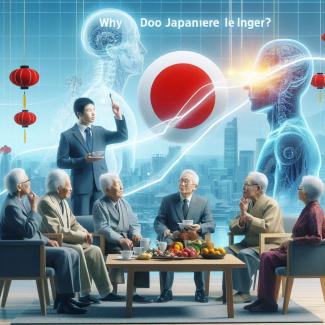
Japanese people have one of the highest life expectancies in the world, and there are several factors that contribute to their longer lifespan:
- Healthy Diet: Japanese cuisine is often cited as one of the key factors in their longevity. The traditional Japanese diet is rich in fresh fish, vegetables, tofu, and rice. It is low in saturated fats and processed foods, which are associated with various health problems.
- Active Lifestyle: Many Japanese people maintain an active lifestyle, with a focus on walking and cycling for transportation. Additionally, there's a strong cultural emphasis on daily physical activity, such as traditional practices like martial arts, gardening, and other recreational activities.
- Healthcare System: Japan has a well-developed healthcare system with good access to medical care. Regular health check-ups and early detection and treatment of diseases play a crucial role in improving overall health and longevity.
- Social Support: Strong social bonds and community support are common in Japanese culture. Social connections and a sense of belonging are associated with improved mental and physical health.
- Low Obesity Rates: The obesity rates in Japan are lower than in many other developed countries. Excess weight and obesity are linked to various health problems, so this contributes to longer lifespans.
- Low Rates of Smoking: Japan has made efforts to reduce smoking rates, which is another significant factor in increasing life expectancy. Smoking is a leading cause of preventable death worldwide.
- Low Rates of Alcohol Consumption: While alcohol is consumed in Japan, it is typically consumed in moderation, which may contribute to better health outcomes.
- Healthcare Practices: Traditional Japanese healthcare practices, such as acupuncture and herbal medicine, are still popular and contribute to overall well-being for some individuals.
- Genetics: Genetics can also play a role in determining the average lifespan of a population, although lifestyle and environmental factors often have a more significant impact.
It's important to note that while these factors contribute to longer life expectancy in Japan, not all Japanese individuals enjoy the same health outcomes, and there is some variability in lifespan within the population. Additionally, Japan's demographic makeup, with a significant proportion of elderly citizens, can impact average life expectancy figures.






